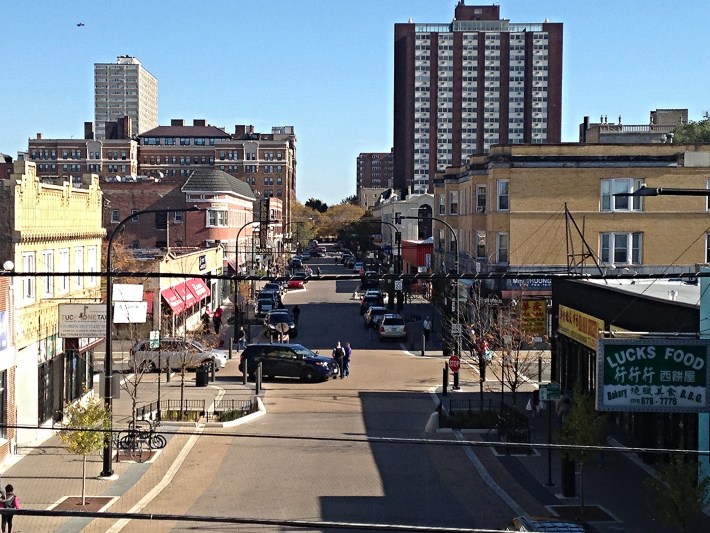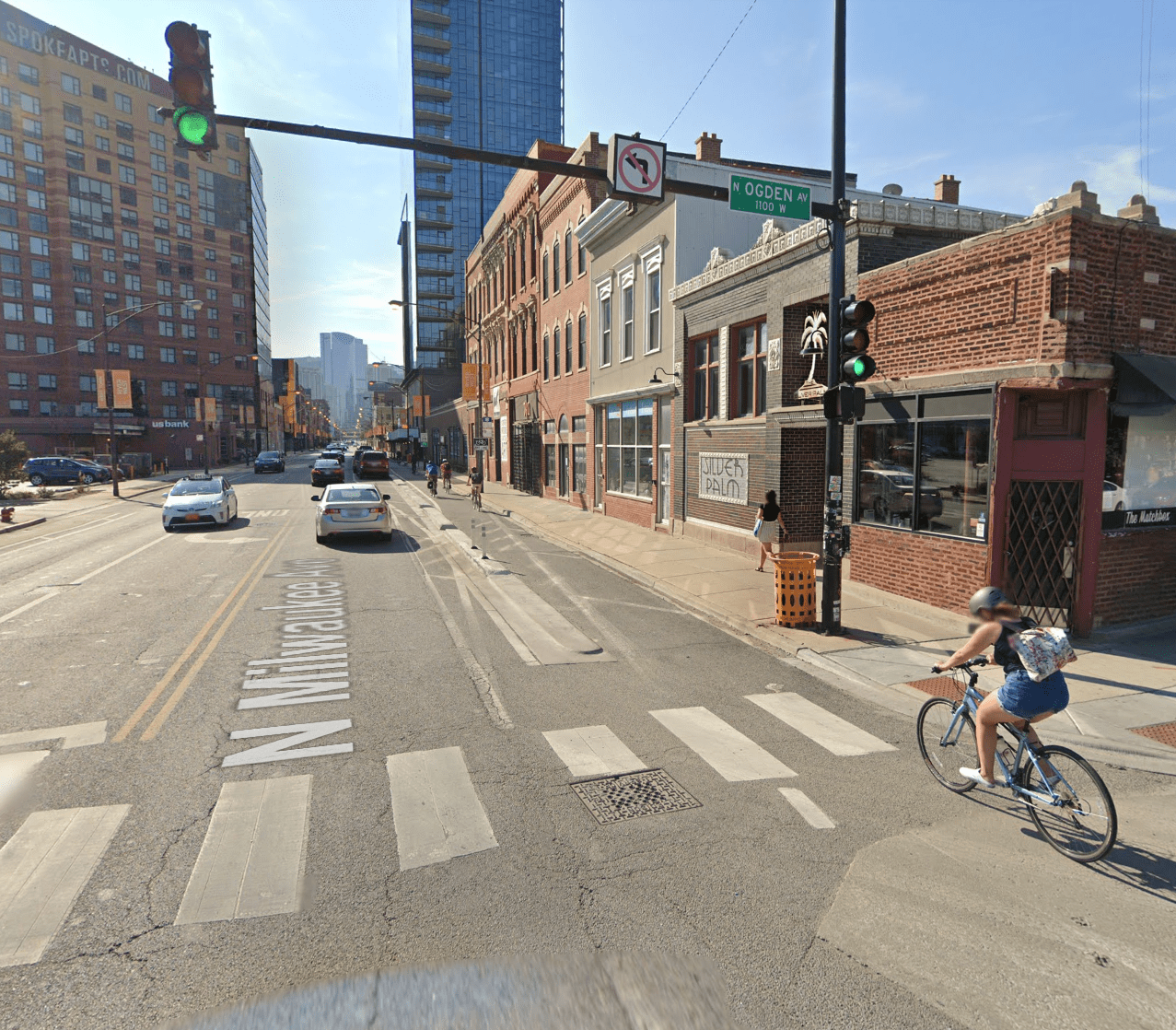When former mayor Richard M. Daley forced the passage of the contract that sold off Chicago's parking meters near the end of his administration in 2008, he struck one of the worst deals for Chicago ever. The contract, which outsourced the operational responsibilities and revenue rights for Chicago’s metered parking to private investors represented by Morgan Stanley for a period of 75 years, has been detested ever since. Drivers hated the meter rate increases. Everyone would have preferred the parking revenue stay with the city. Nowadays hating the deal is like eating hotdogs without ketchup: It’s part of the city’s cultural heritage.
The contract has been particularly frustrating for sustainable transportation advocates. One particularly confounding clause dictates that the number of metered spots remain fixed just above 30,000 citywide. In other words, Chicago has very limited control over significant portions of its streetscape, because it must maintain these metered parking spots, and all so that some investors can profit easily.
This often complicates or blocks efforts to install robust bus or bike lanes, let alone pedestrianizing streets. If metered spaces are removed to make room for more productive uses of the right-of-way, Chicago is required to either create new metered spaces elsewhere or pay a fee to the concessionaire.
The deal was not written in the city’s favor. Those who agreed to its 75-year duration did not account for the fact that major unknown shifts in mobility would almost certainly occur during its tenure. Major changes in the way people get around – ride-hail and bike-share, for example – have already occurred in the thirteen years since the deal passed.
The contract was also written to be particularly difficult to break. But we shouldn't give up hope on extricating ourselves from the deal, because there is one nuclear option left: We can just ignore it.
Recently I argued that Chicago needs to establish an office of parking management in order to better use and plan the city’s parking assets. This was prompted by reports that officials want to sell several city-owned parking lots on the North and Northwest sides. I argued these lots offer an opportunity to shift some metered parking off-street at key locations in order to make streets more pedestrian- and bike-friendly. If this office existed, more of such opportunities would be identified. And this department would help the city overcome some of the more restrictive aspects of the deal.
Granted, an office of parking management is an imperfect solution. Having such a department is important no matter who controls the rights to the city’s metered parking, but any potential solution to the contract’s many restrictions will fall short as long as long as the city attempts to comply with the deal.
The contract was designed to be a mechanism to funnel profits to private interests by exploiting a public resource. This is fundamentally unacceptable. The city can neither maintain the status quo nor afford to jump through hoops for another six decades. It would be cheaper and less painful to just break the deal.
That's not to say there aren’t workarounds that could somewhat defang the contract. While preparing to write this piece I spent a lot of time researching these options. I did field observations of city streets. I examined design guidelines for parking, street layouts, and bike and bus lanes. I conducted interviews for another planned article that got sidelined by the pandemic. I dug deep into the deal itself.
These workarounds fall into two categories: design and policy. The design solutions are straight forward enough. They’re actually being used to a small degree at some strategic location. As mentioned above, solutions include shifting the location of metered parking from main streets to nearby side streets or elsewhere in the neighborhood. And it kind of works.
Chicago has used this strategy in a few locations to make more space for people on main streets. The new protected bike lanes on Milwaukee Avenue between Western and California avenue are one example. This approach was also used on Argyle Street in Uptown when some of the parking needed to be eliminated to create a pedestrian-friendly "shared street." This method could enable the pedestrianization of significant streets like Clark through Andersonville and portions of Broadway in Lakeview East.

The second approach is policy solutions. The city could attempt to renegotiate a reduction in the required number of metered parking spaces by changing the formula used to calculate the system’s value (which is used to determine annual revenue goals and meter rates) or using new methods to charge rates. This includes options like valuing the system by other metrics (like the value of curb space and not spots), employing variable-price parking (having rates change based on demand), or using other revenue entirely like fees charged to use parking spots for ride-hail or delivery services.
The issue remains that these workarounds are just that: workarounds. They aren’t bad solutions in their own right. They could be very valuable tools for street design and parking management if the city had full control of its metered parking. The design solutions should certainly be pursued more aggressively.
But as long as the city aims to work within the contract, we are acknowledging the deal’s legitimacy, and we shouldn’t be prioritizing private interests over public ones. It leaves citizens on the hook for all the costs, while investors profit. Chicago shouldn't tolerate any of these things. We all know it was a bad deal. We all know Daley screwed us. Let’s just throw up our arms and do what’s best, and what we want to do finally, and break the deal.
Reneging on the contract would likely cause some pain for Chicago. It would almost certainly result in a lawsuit. And it would likely probably require the city to pay handsomely in a court settlement. But we should really ask what’s wrong with that? If we took over the meters again, that revenue would be a means of paying back the debt. It took less than 15 years for the investors to start making profits on their investments. Why shouldn't the city plan for the same?
Furthermore, Chicago has options to challenge the contract. The city should explore using legal tools like its reserved powers or force majeure, or irresistible greater force that prevents someone from fulfilling a contract, to attack its underpinning structure. Using the former, the city can argue it needs complete control over what is now metered on-street parking to effectively carry out its right and responsibility to manage traffic. Regarding the latter, if ever there was a force majeure it is the climate crisis. There is no question that transportation is a major contributor to climate change and the city must be able to act accordingly to reduce the associated emissions. That requires breaking the contract.
Chicago could also force arbitration or simply ignore the deal. It’s not like Chicago hasn’t taken such bold moves before. I find it incredibly ironic that City Hall has for years said we’re stuck with the contract, when the mayor who forced it through is equally famous for literally destroying an airport in the dark of night, because he wanted to. So why not do the same thing with the parking meter deal?
And absent these solutions working (or one of the private lawsuits challenging it), the city must start acting like it has full control of metered parking. Remove it. Expand sidewalks. Install bike lanes. Build bus lanes. Let the investors sue. They’d probably just settle anyhow. And it’s not as if the city doesn’t already pay out millions in settlements for police abuse cases every year. Unlike police settlements, there would be a sustainable revenue stream to pay for parking meter contract settlements.
Even if the investors don’t settle and drag the case through the court, this process will last for quite some time during which the city could just keep building out alternative transportation infrastructure. Let Morgan Stanley try to rip it out once it’s been built.
While it is heartening to know the city can attempt to defang the deal through design and policy, none of this is a sustainable solution so long as the city lacks complete control over one of its more significant assets. Curb space and metered parking is incredibly valuable, and the city needs to be able to control it fully if it is to improve traffic flow and encourage alternatives to driving. City Hall might not acknowledge this now, but elections can change the calculation.




